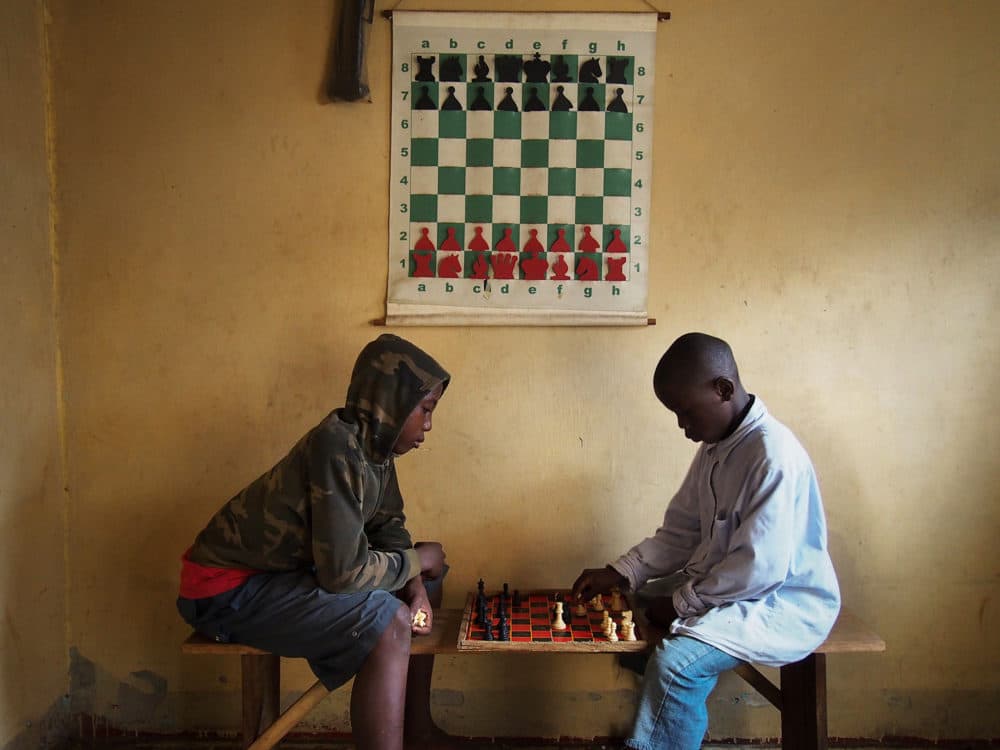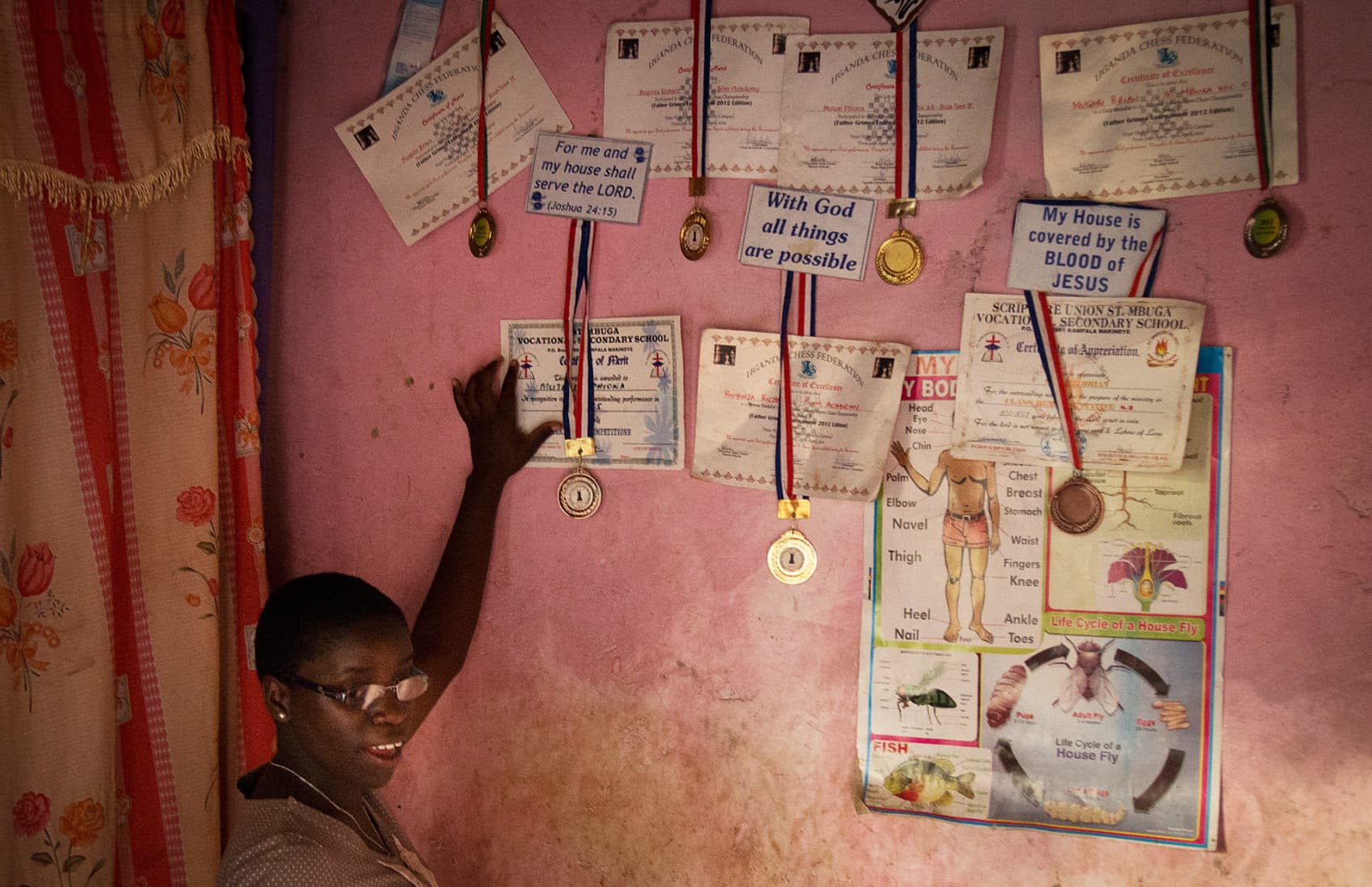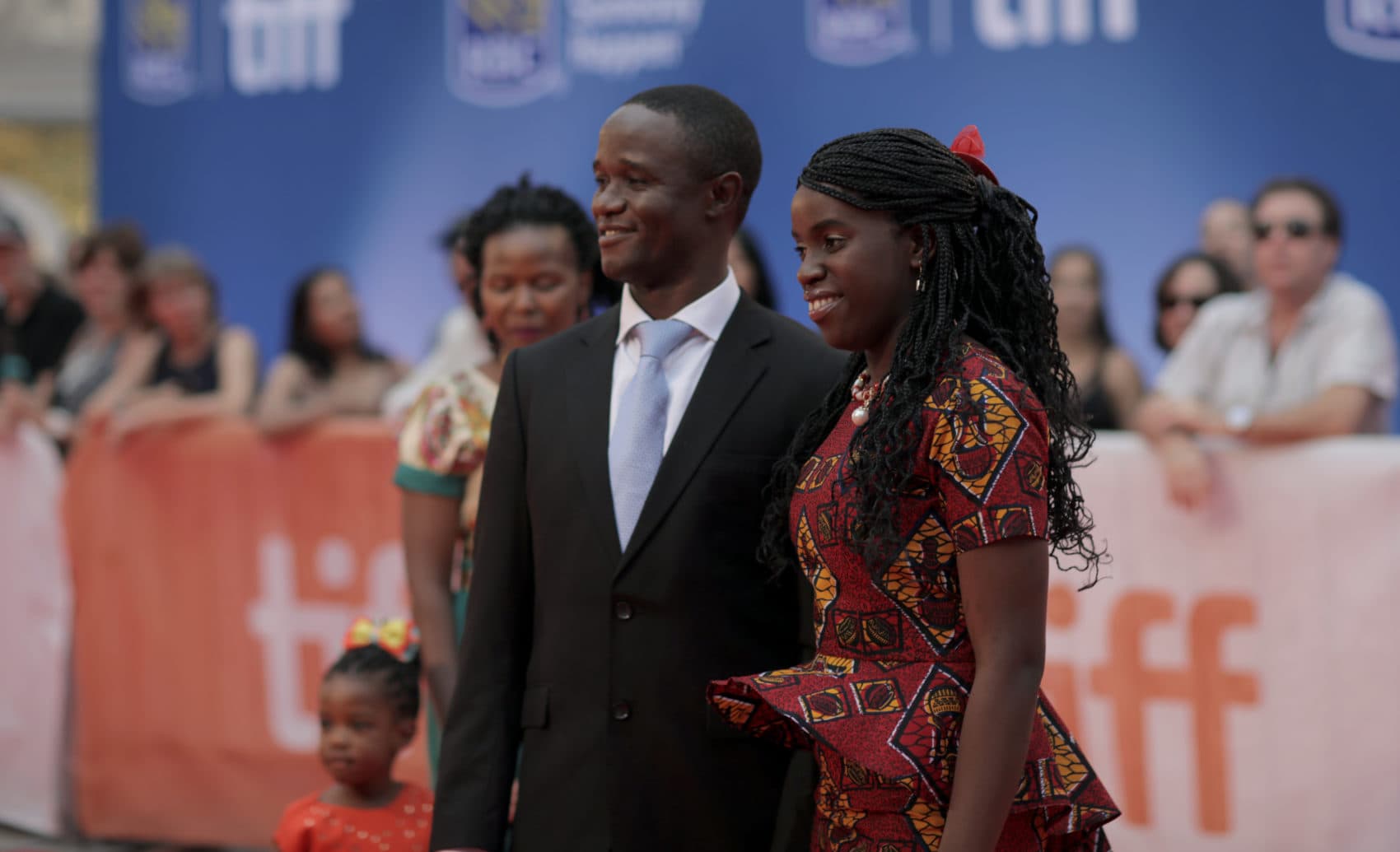Advertisement
After Achieving Chess Fame, 'Queen Of Katwe' Takes New Path

Here’s the part of Phiona Mutesi’s story you might know from the Disney movie "Queen of Katwe."
She grew up in Katwe, Kampala’s largest slum. Her dad died when she was a toddler. Starting at a young age, she and her siblings had to sell maize on the street instead of going to school.
"My life was just surviving," Mutesi says.
She and her siblings also had to do all the work around the house — the cooking, the cleaning. They hated it. So, when it was time to do the chores, they’d go into a room in their house where they’d have a fist fight to see who had to do the work.
Mutesi says they had a name for that room.
"We called it a war zone," Mutesi says. "So the person who lost had to do everything."
She says those fights with her brothers shaped what happened next.
Chess In Kampala
When she was 9, she found out about a chess club in the neighborhood. If you learned how to play chess, you could get a free meal. At first, Mutesi went for the food — but she started to get good at the game.
One day, she beat everyone at the club except for one person: the player who, at the time, was the reigning champion.

Mutesi and the champion faced off. All the other kids gathered around the board to watch. Mutesi remembers there being about 60 of them.
"The other boys around, they were telling him, ‘How can a girl beat you? You can’t allow that,’ " she remembers.
The boy didn’t allow Mutesi to win, but she won nonetheless.
She says, after that, she didn’t need to fight with fists anymore. She fought with knights, rooks and pawns.
"After winning this boy, I’m, like, ‘I can beat any other boy in the whole world!’ " Mutesi says. "Back in Africa, the society — the way it trains us — it trains us to be, like, 'We women are nothing. Boys are the ones who go to school. The girls are supposed to be home.'
"My grandmother did not go to school. My mother did not go to school — she got married when she was 16. The same thing happened to my sister. She also gave birth when she was 16. And, actually, her first daughter — I just heard that she was pregnant. She’s 17. It’s like a curse. You know, like, your family will never make it."
Advertisement
But, after the game where Mutesi beat the club’s chess champion, she felt like she might have a chance to break that curse — by using chess.
Mutesi was shockingly good. She started going to bigger and bigger competitions. By the time she was a teenager, she was representing Uganda at international tournaments.
But the doubts would still creep in.
"Whenever I went to these new places, like, I saw a lot of stuff — and I was like, ‘I wish I had this. I wish I had this,’ " Mutesi remembers. "And, like, I didn’t want to go back home, always. Because I felt like, right now, I’m in this expensive hotel. And I am getting good food. At home, we have no food. I’m homeless. I don’t have anywhere. My life is not going to change. I’ll never be nothing."
But Mutesi was wrong. Her life did start to change.

The Queen Of Katwe
She got a scholarship so she could go back to school. And she won enough tournaments that she attracted the attention of ESPN journalist Tim Crothers, who wrote a book about her.
Crother's spoke about Mutesi's chess prospects in an interview with Only A Game back in 2012.
"She now has her foot on the ladder toward becoming a grandmaster," Crothers said. "If she’s able to gain a couple of more rungs on that ladder, she becomes a player who earns sponsorship. And so, she can actually begin to subsist as a chess player. That is her goal. To be able to get to a point where she can help take her mother, her sister, her two brothers out of Katwe and take them to a safer place to live.
"This is her one special gift. It gives her the opportunity to possibly rescue her family from the situation that’s so dire at this point."
But it wasn’t Mutesi's 'one special gift' that got her family out of the slum. It was her story.
She got some money from Crothers’ book — enough to buy a house for her mom and to ensure that her family wouldn’t have to worry about food anymore.
But, at the same time, she was starting to doubt whether chess really was a viable future.
"When I was 17 — I was winning a lot of tournaments," she says. "Like, I’d become a champion in Uganda."
The problem was that there are only three big chess tournaments in Uganda every year. Those were the tournaments Mutesi kept winning.
"And it’s, like, not a lot of money that’s going to take you for the whole year until next year," she explains.
In 2016, Disney turned Crothers’ book into the movie "Queen of Katwe."
But Mutesi got no money at all from that. And she didn’t feel her chess was as good as everyone else seemed to.
"My name, like, went so high, and my chess — it was still so low," she says. "I wasn’t even the best chess champion, like, in Uganda. It was so hard."
Mutesi says she tried hard to change that — to catch up to her name.
"I was working hard," she says. "But the more I worked hard, I couldn’t find my name. My name is there, but my chess is still here. I’m working so hard on it, and I felt like I was starting to forget about myself, my family."
A Different Path
Mutesi wasn’t happy. She was starting to think chess wasn’t what she wanted to do with the rest of her life. At one tournament, she hid from reporters to cry.
"I felt like I was pushed. Not because I wanted, but because of other people," she says.
That’s when her coach, Robert Katende, intervened.

Katende isn’t a professional chess coach. By training, he’s an engineer. He uses chess as a tool to mentor young people in the slums of Kampala.
Mutesi thought she might do better if she had a professional coach who could teach her the more complicated strategy she’d need to perform on the world stage.
" ‘We don’t have the money for the coach you want,’ " Mutesi remembers Katende telling her. " ‘I notice people expect you to do this, but what are you expecting yourself to be doing in your life?’ "
Mutesi thought about it. And she decided what she wanted for herself was an education — the education her grandmother, mother and sister had never had a chance to get.
“I feel like chess has opened the door for me.”
Phiona Mutesi
And it was chess that gave her the chance. At the Seattle premiere of "Queen of Katwe," the president of a small Christian college, Northwest University, offered Mutesi a scholarship.
That’s how she ended up in the Seattle suburb of Kirkland.
Northwest University
It has not been easy. When Mutesi arrived for college in the fall of 2017, she didn’t know how to type or use a computer.
"I remember, like, in the first week, they gave us an assignment of just, like, two pages, and I had to type it in," Mutesi says. "I spent, like, four days typing. It was so hard for me. People were finishing within, like, 10 minutes — and I’m just doing this for four days."

And then there’s the thing almost everyone has to contend with when they go off to college: homesickness. Life in a sleepy Seattle suburb is very different from life in Kampala.
"At home, in the whole area, you should be knowing each person, and everyone is responsible to each other," Mutesi says. "So, I grew up in this community whereby if I’d done something somewhere, my mom would know. And before her knowing, I would be punished by another parent somewhere. And it’s OK.
"So it’s like a community thing that is there. And I never appreciated it until I came here — and I’m, like, ‘Everyone lives by themselves. Like, people don’t care.’ "
On top of all that, Mutesi still has to worry about money. Her scholarship covers tuition, but not room and board and travel to and from Uganda.
So she works as a motivational speaker, traveling up and down the West Coast. She also receives money from donors. It’s not much, but she gets by.
With all that, Mutesi barely has time for chess. Days go by when she doesn’t even play. She doesn't mind, though. That’s not why she came here.
"I don’t feel like I really have love for chess like the way I used to have," she says. "Because, during that time, I felt like [chess was all] I had to use in my life. But, right now, I feel like there are a lot of stuff that I can do in my life. I feel like chess has opened the door for me.
"I’m so happy that I’ve made it this far."
Academics may now be taking priority in Mutesi's life, but she hasn’t given up chess entirely. When she’s at home ...
"We are old, but if one doesn’t want to do like dishes or cooking, we decide with a game," she says.
This segment aired on January 12, 2019.
